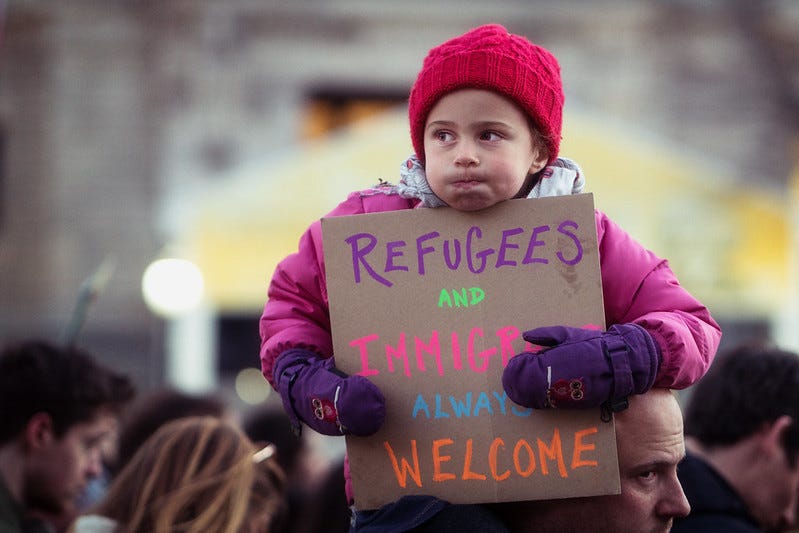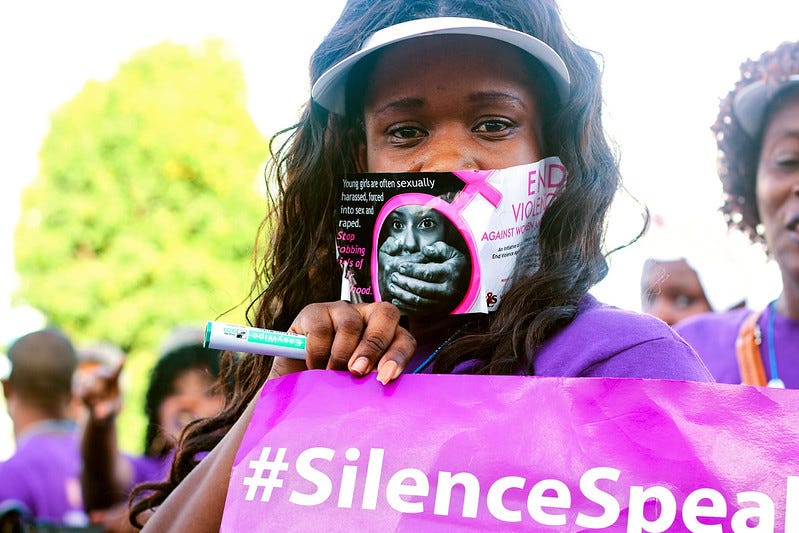Global Roundup: Female Filmmakers Focus on Older Women in South Korea and the African-Australian Experience, a Latina STEM Entrepreneur, New Laws vs Coercive Control
Compiled and written by Inaara Merani
SOURCE: BUSAN INTERNATIONAL FILM FESTIVAL via ScreenDaily.com
The South Korean film industry is undergoing a “female film new wave”. More women are working behind the scenes and more women are stepping into the role of directors. This new generation of female Korean filmmakers is using their platform to address sexual violence through cinema. Following the groundbreaking success of the movie Parasite, the world began to praise the South Korean film industry for its ability to break into the western mainstream. This praise has been limited to the famous male filmmakers, and there has been limited attention towards the women in the industry, even though they have been KILLING it. In the independent sector of the film industry, female directors have been very active, however there is a large disparity between the amount of female filmmakers versus male, and these women are not getting the credit they deserve.
Last year, Lim Sun-ae released her debut film An Old Lady which screened at the London Korean Film Festival last week. This film explores the true story of a 69-year old woman who is raped by her physical therapist and struggles to find anyone to believe her. Lim wanted to focus on the elderly in particular because many American films have centred the experiences of young, middle-class protagonists. As fucked up as it is, there is a high proportion of elderly women who experience sexual assault and it is crucial that light is shed on this issue.
There have been a lot of films dealing with sexual violence, yet not where the victims are elderly women…I was interested in stories yet untold — in this case, the elderly women sitting in a ‘blind spot’ amongst sexual violence crimes. The issue of sexual violence opened the door to the story, but what I really wanted to talk about was the prejudiced and discriminatory gaze through which our society looks upon the elderly - Lim Sun-ae
Another film focusing on sexual violence at the London Korean Film Festival was Kim Mi-jo’s Gull. Gull is about a middle-aged, working-class woman who is assaulted while drinking with her fish market colleagues. Similar to An Old Lady, this film is based on a true story.
These films are just two examples of a plethora of new films directed by female filmmakers. The South Korean film industry is undergoing important changes and different forms of diversity are being integrated into these films. Kudos to these badass women!!
—————————-
U.S. border patrol agents routinely turn away asylum seekers, requiring them to wait in Mexico for their U.S. court hearing. (Lorie Shaull / Flickr) Via Ms.Magazine.com
A brave whistleblower recently reported that women immigrants at an Immigration and Customs Enforcement (ICE) detention centre have been subjected to gynecological procedures without their knowledge or informed consent. The procedures allegedly ranged from forced sterilizations to hysterectomies—performed on women who neither needed nor wanted them. Since this individual came forward, 19 women spoke out about the medical abuses they endured, and what happened after this is fucked up.
Six of the patients who complained about these medical abuses have already been deported, and seven others who made allegations have been informed that they could soon be removed from the country. But the fuckery does not stop here. These cases are just one example of reproductive injustices committed against immigrant women in ICE centres.
Since 2017, the ACLU has sued the Department of Health and Human Services on several occasions for denying detainees their LEGAL right to an abortion. Scott Lloyd was the director of the Office of Refugee Resettlement and was vehemently opposed to abortion. In other words: another Trump minion. He went so far as to track pregnancies and menstrual cycles of detainees who requested pregnancy tests so that he could delay their departure from shelters until they were past the point of legally obtaining an abortion. That is royally fucked up.
Time and time again, institutionalized patriarchy continues to dictate how women should live their lives. How long must we live under the constraints of this worldwide patriarchal dictatorship? When will women be liberated in their struggle against patriarchal fuckery?
Unfortunately, for thousands of women and girls, these reported violations are just a sampling of the government’s illegal practices of aggression and neglect in its treatment of women seeking to immigrate to the United States.”
Traveling to the U.S. border only exacerbates the danger for migrants, as incidents of rape and sexual assault are rampant along the journey. On the border, victims of such attacks number in the thousands. Given the precarity of their situations, most women and girls do not report these crimes, which go uninvestigated and unprosecuted.
And for those who do make it across the border and find themselves in U.S. government hands, this cycle of violence may go from bad to worse.
—————————-
Photo courtesy of southseattleemerald.com Via BeLatina.com
Lorena Soriano is a well-known entrepreneur who is leading STEM with her inclusive practices. Growing up, Soriano always knew she wanted to be a scientist and a doctor, but did not see any Latina representation in this field. She would see scientists like Bill Nye on TV but did not think she could pursue a future in STEM because she did not see any other Latina women doing so. This is what prompted her to start her business career. After working with Wells Fargo and recognizing the unethical habits in her workplace, she decided to follow her childhood dream of being a woman in STEM.
After realizing that she did not want to become a doctor or a scientist, she decided to pursue a different route. Soriano decided to combine her two passions, STEM and business, to encourage women’s inclusion in the industry.
I think the one thing I wanted to change [as a kid] is the way that the world saw me…We were immigrants…just by people seeing our name or knowing that I didn’t speak English, they already assumed where I was from, and they put me into a box - Lorena Soriano
She first started Global Girls Give, a nonprofit organization which fosters mentorships and connections for women and girls around the world. She then founded Every Point One, which is an initiative that seeks to ensure the people who design and create STEM products are representative of the population. Soriano wants to ensure that everyone feels welcome in STEM and business by creating representation for every group in society.
——————-
At UN Women’s International Day for the Elimination of Violence against Women in 2016. (UN Women / Khristina Godfrey) Via MsMagazine.com
Rates of domestic violence and intimate partner violence have sharply increased around the world during the pandemic. In response to these staggering rates, Hawaii and California have become the first two states in the United States to pass laws against coercive control. Coercive control is nonphysical abuse such as: psychological, sexual, financial and emotional abuse. The goal of coercive control is to make one’s partner feel subordinate or dependent by isolating them from sources of support. Domestic violence laws usually focus on discrete acts of physical violence, and fail to focus on the behaviours that precede physical violence.
Coercive control is a gateway to physical violence…A high percentage of people who engage in coercive control will eventually resort to physical violence - Doreen Hunter, co-founder of the Americas Conference to End Coercive Control
Several countries, including Scotland, France, England, Wales and Ireland, have adopted coercive control laws over the last decade. The Hawaii law was inspired by legislation passed in Scotland in 2018. The new law in Hawaii denotes coercive control as a class A felony and perpetrators can be criminally prosecuted. The law will also allow courts to consider evidence of coercive control when deciding whether a protective order against the abuser is appropriate. In California, the state’s family code has been amended so that coercive control will be considered in custody and visitation agreements.
Many other states such as New York, South Carolina, and Maryland are following suit and are currently considering implementing coercive control laws. It is inspiring to see so many states step up and fight back against acts of violence in all its forms. This is just one step forward in a long battle ahead.
——————————-
Imagine Via Women’s Media Centre
Growing up in Melbourne, Australia, as a child of Egyptian-Eritrean parents, Rendah Haj came to the realization that many people had preconceived notions of the community she grew up in. Australia is a predominantly white society and Haj emphasizes that the African migrant experience is never genuinely or honestly depicted. As such, Haj decided to study film at RMIT University and began to focus on how she could create work which was centred around identity and social justice issues. Her new short documentary, Hayat, is streaming at the DOC NYC Film Festival until November 19. This documentary takes a look inside an Eritrean family’s daily life and watches the protagonist adapt to her new adopted country.
Haj wanted to showcase the migrant experience in a different light. Often, migrant experiences in film are defined by conflict and struggle, and this is not the case.
Most of the time, if the African migrant experience is defined in any way, it’s as a struggle — and I absolutely hate that. I felt like I went through that growing up because it felt like people were always looking at me negatively, or feeling sorry for me. I’m just like, “that’s not what it is.” Everyone in life goes through stuff - Rendah Haj
Her film also comes at a time when the Black Lives Matter movement and the global refugee crisis are both a focal point in the media. Haj highlights that this film challenges perceptions of African migrants and refugees and depicts the harsh treatment that many Muslim families face around the world.
——————————-
Inaara Merani (she/her) is a fourth-year undergraduate student at the University of Ottawa studying International Development and Globalization with a minor in Women’s Studies. She is a Muslim Canadian who is passionate about human rights, social justice and feminism. She is deeply interested in destroying the patriarchy and ensuring that all women have safe and equal access to all their rights. She hopes to pursue a career in law so she can fight for women’s rights! She also enjoys reading, travelling and spending time with her beautiful cat.






